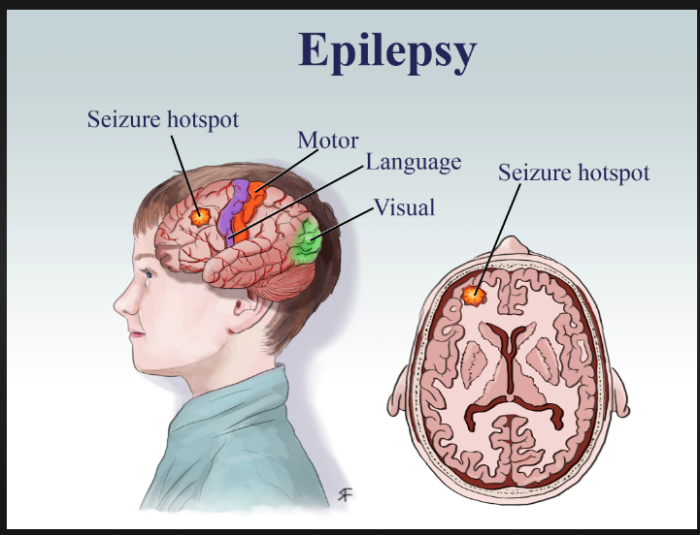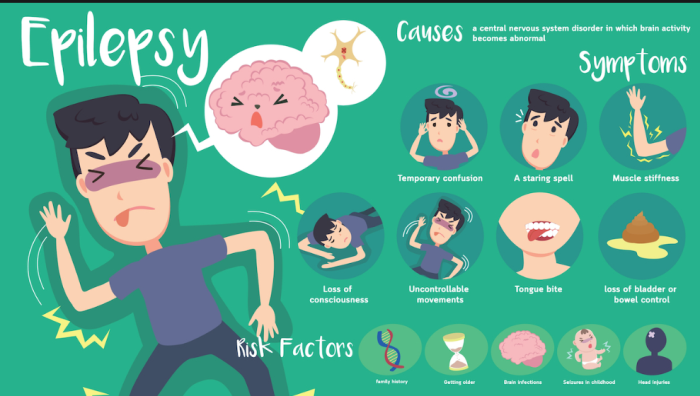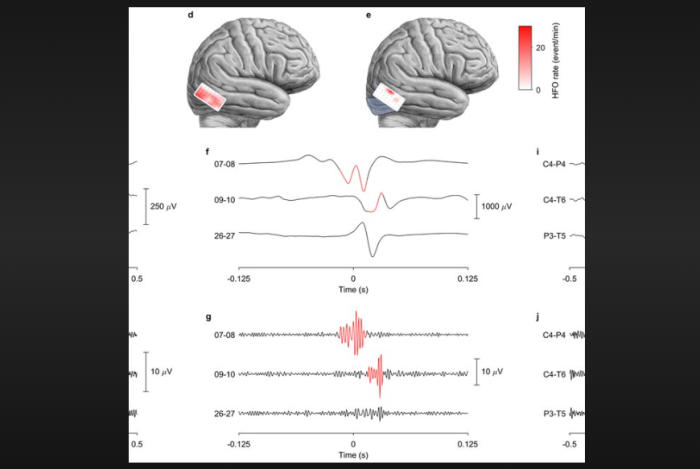Introduction to Epilepsy Surgery: Why Is It Considered?
Epilepsy surgery is an option for people with drug-resistant epilepsy whose seizures cannot be controlled by medication. Surgery aims to remove or modify the part of the brain responsible for seizure activity, improving overall seizure control and quality of life. It is usually recommended when other treatments fail, and seizure freedom is a key goal for the patient.
Medical disclaimer: This content is for general awareness and does not replace a doctor’s consultation. For diagnosis or treatment decisions, consult a qualified specialist.

The Basics of Epilepsy: Causes and Symptoms
Epilepsy is a chronic neurological condition characterized by recurring seizures. It can occur due to brain injury, genetic factors, infections, or stroke. The primary symptoms include uncontrolled movements, loss of consciousness, and sensory disturbances. Understanding these symptoms is essential when considering surgery as an option for long-term seizure control.

When Medication Isn’t Enough: The Need for Surgery
For some patients, anti-epileptic drugs (AEDs) are not enough to prevent seizures, leading to the need for surgical intervention. Surgery is typically considered when seizures are frequent and debilitating, severely affecting a person’s ability to live a normal life. If medication fails to provide relief after two or more years, surgical evaluation becomes the next step.
Understanding Refractory Epilepsy and Its Impact on Patients
Refractory epilepsy is a condition where seizures persist despite trying multiple medications. For individuals with drug-resistant epilepsy, surgery is often seen as a way to achieve seizure freedom. Without surgical intervention, patients may face worsening cognitive, psychological, and physical health issues.
How Long Should You Be on Medication Before Considering Surgery?
Doctors usually recommend considering surgery after a period of unsuccessful drug treatment. If seizures persist after 2-3 years of multiple anti-epileptic drugs, surgery may be considered, particularly if the seizures are affecting quality of life and neurological function.
The Role of Seizure Frequency in Surgical Decision-Making
The frequency of seizures plays a significant role in determining whether surgery is needed. For people experiencing daily or frequent seizures despite medication, surgery may be considered. In such cases, surgical intervention is crucial for improving daily functioning and preventing long-term neurological damage.

Evaluating Seizure Types: Are Some More Surgery-Eligible Than Others?
Not all types of seizures are candidates for surgery. Focal seizures, which originate from one specific area of the brain, are more likely to be treated with surgical resection. Generalized seizures, which affect the whole brain, may require other approaches or treatments.
How Brain Imaging Plays a Role in Surgical Planning
Advanced brain imaging techniques, such as MRI and PET scans, play a critical role in identifying the epileptogenic zone—the area of the brain responsible for seizures. Proper imaging helps neurosurgeons plan the precise location to target during surgery, ensuring optimal outcomes for seizure control.
Neuropsychological Testing: What It Tells Us About Epilepsy Surgery Candidates
Neuropsychological testing helps assess the cognitive impact of epilepsy and its treatment. This testing evaluates memory, attention, and other cognitive functions, which are crucial in determining whether surgery could lead to better outcomes without compromising cognitive health.
Determining the Epileptogenic Zone: What Does It Mean for Surgery?
The epileptogenic zone refers to the brain region where seizure activity originates. Identifying this area is key to determining if surgery is appropriate. Removing or disabling this zone can offer seizure relief, but it requires careful planning to avoid affecting important brain functions.
The Impact of Age on Epilepsy Surgery Outcomes
Learn how ageaffects the success rates of epilepsy surgery . Younger patients often experience better outcomes, but older patients may face higher risks. Age-related health conditions and the duration of epilepsy can also influence the effectiveness of surgery.
When Seizures Severely Affect Quality of Life: The Surgical Indicator
When seizures disrupt daily life, work, and relationships, surgery becomes a consideration. Severe seizure impact on quality of life is a critical factor in recommending surgical intervention, as it offers a chance to regain normalcy and reduce dependency on medications.
Best Epilepsy Surgery Treatment in India
The Best Epilepsy Surgery Treatment in India is performed by expert neurologists who use advanced techniques to ensure optimal outcomes for patients, offering a personalized treatment plan tailored to individual health needs.
Best Epilepsy Surgery Hospitals in India
The Best Epilepsy Surgery Hospitals in India are equipped with state-of-the-art technology and facilities, providing top-notch care, including pre-surgery consultations, surgical expertise, and post-operative recovery support to ensure a smooth patient journey.
Epilepsy Surgery Cost in India
When considering the Epilepsy Surgery Cost in India, patients benefit from affordable and transparent pricing at leading hospitals, which offer cost-effective treatment options without compromising the quality of care.
Best Epilepsy Surgery Doctors in India
The Best Epilepsy Surgery Doctors in India are highly experienced in performing the surgery, utilizing a patient-centric approach that ensures personalized care, precise surgical techniques, and dedicated follow-up care to enhance recovery.
The Risks of Epilepsy Surgery: What You Need to Know
While epilepsy surgery can offer relief, it carries risks such as cognitive decline, neurological deficits, or surgical complications. A thorough assessment of the potential risks and benefits is essential before deciding to proceed with surgery.
When Should Surgery Be Considered for Children with Epilepsy?
In children, epilepsy surgery is considered when seizures are severely affecting development, education, and social functioning. The decision for surgery should involve careful evaluation of growth potential and long-term outcomes.
The Role of Epilepsy Surgery in Drug-Resistant Focal Seizures
Focal seizures that originate in one specific brain region are often the most amenable to surgery. If these drug-resistant seizures continue despite medication, surgery can be a life-changing option by removing or disconnecting the seizure focus.
Candidates for Surgery: Who Should Be Evaluated First?
Candidates for epilepsy surgery include individuals who have refractory epilepsy and meet certain diagnostic criteria. These include seizure frequency, seizure types, and the failure of anti-epileptic drugs to provide adequate control.
Pre-Surgical Evaluation: The Multi-Disciplinary Team Approach
Pre-surgical evaluation for epilepsy surgery involves a multidisciplinary team including neurologists, neurosurgeons, psychologists, and imaging specialists. This approach ensures a comprehensive understanding of the patient’s condition before surgery.
Surgical Options: Resective Versus Disconnective Surgery
There are two main types of epilepsy surgery: resective surgery, where the epileptogenic brain tissue is removed, and disconnective surgery, where the connections between the seizure focus and the rest of the brain are severed. The choice depends on the location and type of seizures.
Post-Surgical Recovery: Tips for Patients and Caregivers
Recovery after epilepsy surgery varies, but patients are usually monitored for seizure recurrence and cognitive recovery. It’s important for caregivers to provide support during the post-surgical recovery phase, which may include rehabilitation and therapy.
Long-Term Expectations After Epilepsy Surgery
Most patients experience a significant reduction in seizure frequency after epilepsy surgery. However, long-term expectations include regular follow-up visits, ongoing assessment of cognitive functions, and the potential need for additional treatments.
Exploring Non-Surgical Treatment Options for Drug-Resistant Epilepsy
Non-surgical options such as vagus nerve stimulation and the ketogenic diet may be considered when surgery is not an option or when patients prefer non-invasive treatments. These options can help manage seizures without the need for surgery.
Emerging Technologies and Treatments
Advances in technology are revolutionizing epilepsy surgery. Techniques like laser ablation and robot-assisted surgery are being explored to reduce recovery times and improve precision in targeting the epileptogenic zone.
Expert Opinions: When Should Surgery Be the Final Option?
Experts recommend considering surgery after all other treatment options have been exhausted. Surgery should be seen as a final option when medication fails to provide adequate seizure control and significantly impacts quality of life.
Signs You Should Seek a Second Opinion About Epilepsy Surgery
If there is uncertainty about the diagnosis or treatment options, seeking a second opinion from another expert or specialized epilepsy center is a wise choice. This can help provide clarity and confidence before moving forward with surgery.
Conclusion: Is Epilepsy Surgery Right for You or Your Loved One?
Epilepsy surgery can provide life-changing benefits for patients with drug-resistant epilepsy. By considering the criteria for surgery, patients can make informed decisions, weighing the potential risks and rewards of this treatment option.
FAQs
1. What is epilepsy surgery?
Epilepsy surgery is a procedure to remove or modify the part of the brain causing seizures in patients with drug-resistant epilepsy.
2. When is surgery required for epilepsy?
Surgery is considered when medications fail to control frequent seizures and they significantly impact quality of life.
3. Is epilepsy surgery safe?
While epilepsy surgery carries risks, including cognitive decline and neurological deficits, it offers seizure control for many patients.
4. How successful is epilepsy surgery?
Studies show that 70-80% of patients experience significant seizure relief after epilepsy surgery.
5. What types of epilepsy are eligible for surgery?
Focal epilepsy is most likely to be treated with surgery, especially if seizures originate from a single area of the brain.
6. What tests are done before epilepsy surgery?
Before surgery, patients undergo tests like MRI, PET scans, and neuropsychological assessments to determine surgical feasibility.
7. Can children undergo epilepsy surgery?
Yes, epilepsy surgery can be considered for children when seizures severely affect their development, education, and social interactions.
8. What is the recovery time after epilepsy surgery?
Recovery can take several months, with many patients experiencing seizure control within 3-6 months after surgery.
9. Are there non-surgical options for epilepsy?
If surgery isn’t an option, treatments like vagus nerve stimulation and the ketogenic diet can help manage seizures.
10. How do I know if epilepsy surgery is right for me?
If you have drug-resistant epilepsy and have exhausted other treatment options, consult with an epilepsy specialist to discuss surgery.